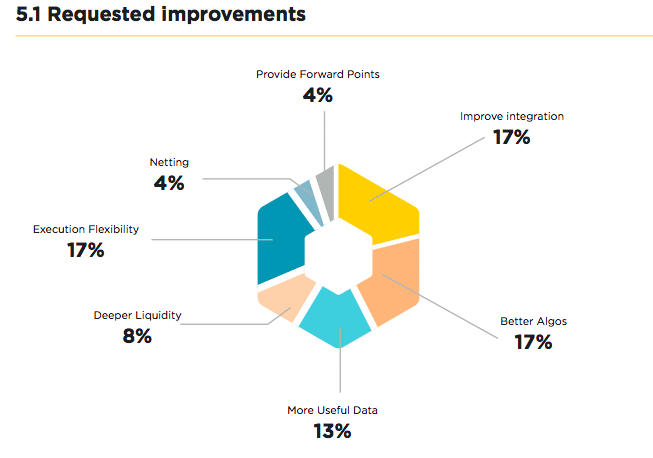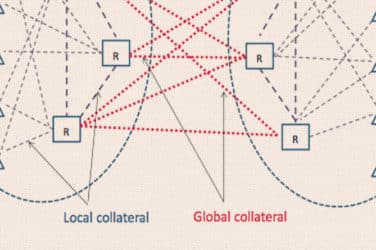
More than three quarters of North American buy-side managers trading foreign exchange for the majority of their time are frustrated with legacy technology and are looking to invest in new platforms.
The Finance Hive, a private network for the senior buy-side community, surveyed 60 North American heads of trading with half working for firms managing more than $100bn (€91bn) of assets in partnership with EBS, the electronic FX platform owned by CME Group. The study found that 77% of respondents want to invest in new platforms.
The head of currency management at Mellon Capital said in the report: “In an ideal world, I would like the opportunity to have more flexibility and seek out the best products for each stage of the investment process, but legacy infrastructure and dealing with all of the integration requirements result in huge projects, where the means often don’t justify the ends.”
EBS said in the report that some market participants believe that delivering one end-to-end monolithic system can solve numerous problems, but the implementation risks involved in switching platforms for the entire trade lifecycle are too great.
“Our belief is that better solutions can be created through rapid integration of multiple existing and new systems through some form of middleware, picking best of breed where it is needed, and leaving robust operational processes firmly in place where they exist,” added EBS. “These middleware solutions have not yet emerged properly in FX, but it seems that the demand is building, and a growing number of asset managers are more willing to implement.”
Ashish Bhagwanjee, senior portfolio manager at Dimensional Fund Advisors, said in the report that he uses a number of platforms.
“We like to think of them as tools in a tool box, so we use different tools for different purposes,” he added. “The main drawback is this approach makes workflow more complex and we have to be mindful of the operational risk that is introduced.”
Transaction cost analysis
Hugh Whelan, global head of liquidity management at EBS, said in an email to Markets Media that the volatility caused by the Covid-19 pandemic in recent months has highlighted the importance of asset managers having transaction cost analysis built into their trading platforms and the increasing pressure to have real-time insight into trading costs.
Whelan continued that one asset manager at a recent Hive event said the ‘the drag factor created by manual processes on execution costs has been exposed recently and will lead to a shift away from this on the buy side.’
“This suggests many portfolio managers will begin to adjust their trading styles to better monitor and benchmark their best execution requirements,” added Whelan. “From working out how to reduce execution costs ($ per million) to ensuring their liquidity providers are responding in a timely manner and pricing competitively, these findings show there needs to be more emphasis on the pre and post-trade execution cost analysis component of any trading platform, and what it can offer in terms of harnessing big data, real-time and as efficiently as possible.”
Less than half of FX market participants use benchmarks to measure trade performance, and fewer use sophisticated TCA systems that have developed in other asset classes according to a report from Greenwich Associates in March this year.
The consultancy said in the study, Digitization Delayed: Why Algos Aren’t More Popular in FX, that this is one of the reasons for the relatively low level of uptake of algorithmic trading in the asset class. Just over a third, 37% of FX market participants use algorithmic trading in the US and Europe, and they account for only 22% of their overall volume. In comparison, in equities almost half of all trading volume, 46%, is executed through either direct market access, smart order routing or algorithmic trades.
However Greenwich expects algo trading to evolve into a mainstay in global FX due to the size of the potential market.
Ken Monahan, senior analyst for Greenwich Associates market structure and technology, said in the report: “Given the potential stakes, it is only a matter of time before issues of data scarcity and other hurdles are addressed and algorithms take on a central role in FX trading.”
FX market liquidity data
In order to provide more transparency in the foreign exchange market, FXLIQUIDITY was launched this week by Mosaic Smart Data, the real-time capital markets data analytics company, in collaboration with CLS, the FX settlement market infrastructure and MUFG, the Japanese bank.
Mosaic Smart Data will publish weekly analysis of liquidity changes across key currency pairs using natural language generation technology to generate instant written reports from the data.
Leveraging our unparalleled source of FX executed trade data, we have collaborated with MUFG and Mosaic Smart Data to further enhance transparency in the FX market. https://t.co/v21msO5G9d#fx #fxmarket #data pic.twitter.com/kEuVmv4uM4
— CLS (@CLSGroup) May 18, 2020
John Winter, chief executive of MUFG Securities EMEA, and head of global markets and corporate and investment banking at MUFG in EMEA, said in a statement that COVID-19 has created many new variables in markets which can be fast-moving and difficult to navigate.
“We wanted to provide a service to our corporate treasury and institutional clients to help them to better understand what is going on and how the situation is developing in as much detail as possible,” Winter added. “Being able to access insights drawn from CLS’s broad view across the markets is a significant part of the solution in rapidly understanding how liquidity flows are evolving.”








